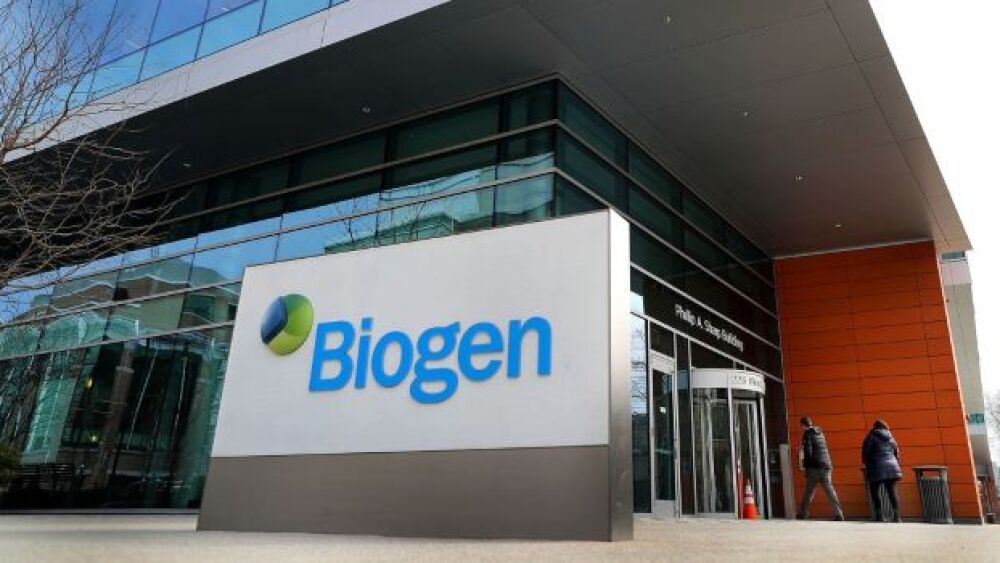At Biogen’s quarterly conference call, outgoing CEO Michel Vounatsos emphasized a strong balance sheet and 10 exciting late-stage programs. The company also raised its 2022 guidance.
John Tlumacki/The Boston Globe via Getty
Biogen is striking an optimistic note heading into the second half of 2022.
Despite a drop of 7% in revenues for the second quarter, the company has increased its guidance for the year. At its quarterly investor conference call Wednesday, Michel Vounatsos, the company’s chief executive officer, emphasized a strong balance sheet and 10 exciting late-stage programs.
Biogen reported $2.589 billion for the second quarter, a drop of 7% compared to 2021 at this time. Its multiple sclerosis (MS) franchise took a hit, dropping 4% to $1.719 billion compared to the previous year, while its spinal muscular atrophy (SMA) drug, Spinraza, dropped 14%.
Even the company’s biosimilars revenue dropped 4%, although it is launching a biosimilar in the United States of Genentech’s Lucentis for wet age-related macular degeneration this year. The company initiated job cuts in May and announced this week that 300 jobs had already been eliminated in Massachusetts.
Although Vounatsos presented the financial data, he is on the way out, as Biogen announced in the first quarter. The company is currently conducting a search for a new chief executive. Vounatsos has helmed the company since 2017 and expects to leave when a new CEO is found.
“We continued to execute on our near-term operational priorities in the second quarter and are pleased to be raising our financial guidance for the year,” Vounatsos stated. “At the same time, we continue to face revenue declines due in part to generic and biosimilar competition for Tecfidera and Rituxan. We made important progress towards bringing new potential treatments to patients suffering from Alzheimer’s disease and depression, which we believe are critical steps on our path to drive value creation for both patients and shareholders over time.”
Biogen Touts Slower Alzheimer’s Progression with Lecanemab
The biggest negative for the company has been the much-publicized failure of Aduhelm (aducanumab), approved for the treatment of Alzheimer’s last June, to gain any traction in the market. In fact, Biogen has faced nothing but strong headwinds and controversy over its efficacy, potentially lethal side effects, price and unwillingness of payers to reimburse for it.
The final blow came when the Centers for Medicare and Medicaid Services (CMS) implemented guidance for the drug, limiting its availability to reimbursement only if used in a clinical trial. In an even more unusual step, the agency applied the guidance to the entire class of beta-amyloid-clearing drugs yet to be submitted for approval.
Although the company continues a Phase IV confirmatory trial for the drug, in late June, it announced it had terminated an observational study of Aduhelm, partly as a result of the national coverage policy and difficulties in enrolling patients.
The company noted that for the quarter, its GAAP restructuring expense was $71 million, which was primarily tied to “substantial elimination of the company’s global commercial infrastructure supporting Aduhelm.”
Biogen’s Biologics License Application for another anti-amyloid monoclonal antibody, lecanemab, also being developed for Alzheimer’s, has been accepted by the FDA under the Accelerated Approval pathway and granted Priority Review, with a decision expected by Jan. 6, 2023.
Dr. Priya Singhal, M.D., MPH, Biogen’s SVP and head of global safety and regulatory sciences, described the company’s pipeline, starting with lecanemab. She noted that in an interim analysis, people receiving the drug “experience slower disease progression compared to baseline.”
Schizophrenia Program Discontinued
A company with expertise in the difficult neurological and neuropsychology space, Biogen has had other struggles as well. After the failed Phase II TALLY study of BIIB104 in cognitive impairment linked to schizophrenia, Biogen has decided to discontinue the program for that indication.
As mentioned above, Biogen updated its revenue and non-GAAP diluted Earnings Per Share (EPS) guidance ranges. The previous guidance for total 2022 revenue was between $9.7 and $10 billion, which the company has now increased to $9.9 to $10.1 billion.
On the call, Chief Financial Officer Michael McDonnell said the increased guidance was due to “better than expected topline performance and continued cost management.”
The guidance assumes oncology drug Rituxan (developed in a partnership with Genentech) will continue to drop due to biosimilar competition, as will Tecfidera for MS in the U.S. due to generic competition, although the company finds the impact of Tecfidera generic competition in Europe harder to predict.
Biogen and Sage to Seek Priority Review in PPD, MDD
On a more promising note, Biogen and Roche are looking toward the possibility of the FDA approving Lunsumio (mosunetuzumab) for relapsed or refractory follicular lymphoma. The European Commission approved the drug for that indication in the second quarter of the year. Biogen will share in the operating profits and losses of the drug in the U.S. in the low to mid 30% range and enjoy low single-digit royalties on ex-U.S. sales.
Earlier this year, Biogen and Sage Therapeutics reported positive results from the Phase III SKYLARK Study of zuranolone to treat women with postpartum depression (PPD). A New Drug Application to the FDA is underway in both PPD and Major Depressive Disorder (MDD), which the partners expect to complete during the second half of this year. They will seek priority review for the drug.





